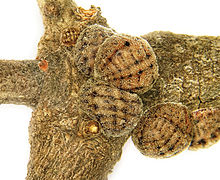Kermes is a genus of scale insects in the order Hemiptera. They feed on the sap of oaks; the females produce a red dye, also called "kermes", that is the source of natural crimson.[1] The word "kermes" is derived from Turkish qirmiz or kirmizi (قرمز), "crimson" (both the colour and the dyestuff),[2] itself deriving from Persian *کرمست (*kermest) via Proto-Indo-Iranian *kŕ̥miš, from Proto-Indo-European *kʷŕ̥mis (“worm”).[3]
| Kermes | |
|---|---|

| |
| Kermes echinatus | |
| Scientific classification | |
| Domain: | Eukaryota |
| Kingdom: | Animalia |
| Phylum: | Arthropoda |
| Class: | Insecta |
| Order: | Hemiptera |
| Suborder: | Sternorrhyncha |
| Family: | Kermesidae |
| Genus: | Kermes Latreille, 1798 |
| Species | |
|
See text | |
There are some 20 species,[4] including:
- Kermes bacciformis Leonardi, 1908
- Kermes corticalis (Nassonov, 1908)
- Kermes echinatus (Balachowsky, 1953)
- Kermes gibbosus Signoret, 1875
- Kermes ilicis (Linnaeus, 1758)
- Kermes roboris (Fourcroy, 1785)
- Kermes vermilio Planchon, 1864
References
edit- ^ Naturenet article with images and description of Kermes vermilio and its foodplant
- ^ "Crimson (n.)". Etymology Online. Retrieved 17 January 2020.
- ^ "Reconstruction:Proto-Indo-European/kʷŕ̥mis", Wiktionary, the free dictionary, 2022-05-10, retrieved 2024-02-08
- ^ Spodek, Malkie; Ben-Dov, Yair (2012). "Morphology of the first-instar nymph and adult female of Kermes echinatus Balachowsky, with a comparison to K. vermilio Planchon (Hemiptera, Coccoidea, Kermesidae)". ZooKeys (246): 11–26. Bibcode:2012ZooK..246...11S. doi:10.3897/zookeys.246.3766. ISSN 1313-2970. PMC 3520143. PMID 23275748.
External links
edit